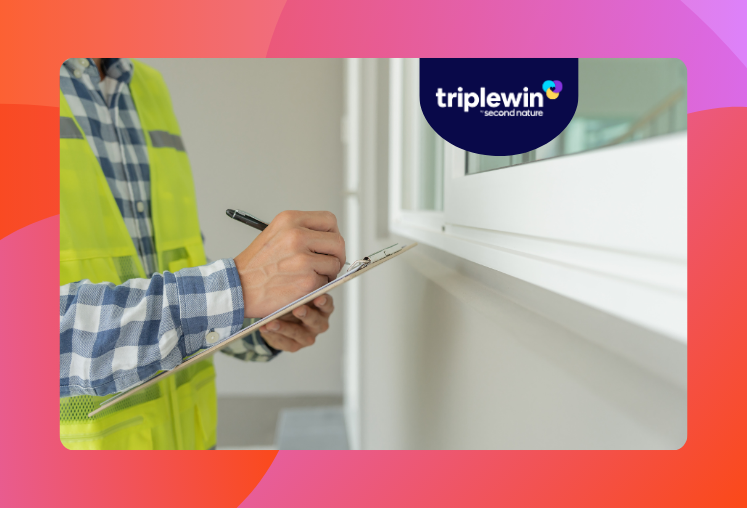There are a couple of reasons why property maintenance is so crucial in managing rental properties. First, no matter the size of the property, keeping up with both its interior and exterior aspects ensures a safe, attractive, and functional environment for residents. Secondly, it protects the value of the property, which is vital for investors.
In today’s post, we’ll take a closer look at the ins and outs of these important services. We’ll discuss:
- What property maintenance services entail
- The benefits of staying on top of these tasks
- Services that are commonly provided to residents
- How planning for both routine and emergency maintenance is crucial
Related: Property Maintenance Guide for Property Managers
What Are Property Maintenance Services?
Property maintenance involves the regular care, repair, and upkeep of a property to ensure that it remains in good working order. It includes building maintenance, as well as maintenance for the exterior portion of the property, such as lawns and driveways.
Maintenance tasks can range from routine inspections and resident requests to emergency repairs. All told, a well-managed maintenance program helps avoid unexpected breakdowns and ensures that all aspects of the property meet safety standards.
For interior maintenance, this can include heating, ventilation, and air conditioning (HVAC) services, plumbing upkeep, and electrical system checks. On the exterior, it includes tasks like landscaping, pest control, and seasonal repairs.
Beyond ensuring that residents are satisfied with their living environment, the main goal of property maintenance is to maintain the real estate value, keeping it visually appealing, and making sure it operates efficiently. Regular inspections can help identify issues before they become larger problems, reducing the likelihood of costly repairs in the future.
Maintenance services also play a key role in resident retention, as residents are more likely to stay in properties that are well-cared for and meet their expectations.
Benefits of property maintenance services
As alluded to above, there are several advantages to keeping up with property maintenance for all parties involved—property managers, property owners, and residents. Here are some key benefits:
- Improved property value: Consistent maintenance keeps the property in excellent condition, which can help preserve or even increase its market value over time. This benefits property managers as well as investors looking to protect their investments against wear and tear.
- Cost prevention: Proactive maintenance helps prevent major breakdowns or expensive repairs down the line. By addressing issues early, property managers can avoid having to deal with larger, costlier problems in the future. For instance, fixing a minor leak can prevent water damage that might require significant structural repairs later.
- Resident retention: Residents are more likely to renew their lease if they live in a well-maintained property. A safe, clean, and functional environment leads to a positive resident experience, which in turn can reduce turnover and vacancy rates. Keeping residents satisfied means they’re less likely to move, saving property managers time and money in finding new occupants.
- Longevity of equipment: Regular maintenance of systems such as HVAC, plumbing, and electrical units ensures they last longer, reducing the frequency of replacements and major repairs. This not only saves money but also minimizes potential disruption to residents down the line.
Most Common Property Maintenance Services
Below are some of the most common types of maintenance services property managers handle:
Interior Services
- HVAC maintenance: This includes regular inspections, filter replacements, and cleaning of heating and cooling systems to ensure they’re in good condition and function efficiently. Maintaining these systems prevents breakdowns and helps reduce energy costs as well as maintenance costs. (Learn more: What is HVAC?)
- Plumbing: From fixing leaks to maintaining water heaters, plumbing issues are common in rental properties all year long. Regular maintenance of pipes, drains, and fixtures can prevent more serious problems later on.
- Electrical systems: Inspecting wiring, outlets, and appliances helps avoid fire hazards and makes sure that all systems operate safely.
- Air filter services: Delivering and replacing air filters (a service offered by Second Nature through our resident benefits program) regularly improves indoor air quality, which benefits residents and the property itself.
- General repairs: Maintaining doors, windows, roofs, and flooring keeps the property functional and appealing. Regular upkeep of these elements reduces the potential for expensive maintenance issues later on.
Exterior Services
- Landscaping and lawn care: Maintaining the appearance of the property’s grounds is essential for curb appeal. Regular lawn care, tree trimming, and other landscaping tasks are necessary for both safety and appearance.
- Pest control: Preventing infestations is key to maintaining resident satisfaction and protecting the property from damage caused by insects or rodents. Pest control is a service offered by Second Nature as part of our resident benefits package. (Learn more: Why Pest Control Is Important)
- Safety inspections: Routine checks of smoke detectors, fire alarms, and carbon monoxide detectors ensure the property complies with safety regulations and provides a secure environment for residents.
Related:
Seasonal checklist for maintenance
Property managers should also consider the timing of certain maintenance tasks. Some jobs need to be handled throughout the year, while others are more seasonal. Here’s a quick property maintenance checklist covering how to plan for routine and seasonal maintenance:
- Year-round maintenance: Regularly check HVAC systems, faucets and plumbing, electrical setups, and safety features like smoke alarms and fire extinguishers to prevent the need for emergency repairs and maintain property safety.
- Winter: Test heating systems and check fire safety equipment.
- Spring: Focus on landscaping and checking the property for mold or water damage that may have occurred over the winter.
- Summer: Lawn care and landscaping tasks such as mowing are essential. It’s also a good time to service HVAC units for cooling needs.
- Fall: Inspect downspouts, clean gutters, and ensure the heating system is ready for the colder months ahead. Fall is also a good time to assess winter readiness by checking for roofing issues such as loose or missing shingles.
Emergency planning
Having a solid emergency maintenance plan is essential for any property manager, as emergencies such as a burst pipe, electrical issues, or fires can happen unexpectedly.
A well-prepared plan should include evacuation routes, emergency contact information, and a clear process for residents to report urgent repairs. Having this in place minimizes damage and ensures resident safety.
Property maintenance services software
Technology plays an important role in making property maintenance more efficient. Many property managers use property management software to streamline maintenance requests, track repairs, and manage ongoing tasks.
These tools help managers keep up with routine maintenance while ensuring residents can easily report issues and track their resolution.
Learn more: 10 Best Property Maintenance Software
Final Thoughts
The bottom line is that a well-maintained residential property not only keeps residents happy but also protects the long-term value of the investment. By staying on top of routine inspections, preventive maintenance, and emergency planning, property managers can avoid costly repairs and create a positive living environment for residents.
For more detailed checklists and resources, explore tools like Second Nature’s rental inspection checklist.
Learn more about the benefits of resident benefits packages.



